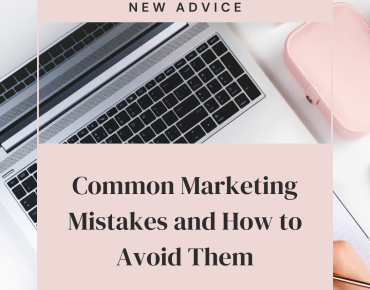October 02, 2023
Common Marketing Mistakes and How to Avoid Them
Best Marketing Strategies for a Start-Up Business
Embarking on a start-up journey is both thrilling and challenging. While an innovative idea can set the ball rolling, it’s the marketing strategy that determines how fast and far that ball travels. The right marketing strategies can amplify your brand message, increase visibility, and skyrocket sales. Here are some of the best marketing strategies for a start-up business:
- Understanding Your Audience
Deep Diving into Demographics: Know who you’re selling to. Understand their age, gender, location, interests, and buying behavior. Tools like Google Analytics can offer insights into who’s visiting your website and why.
Persona Creation: Create detailed customer personas. These fictional, generalized representations of your ideal customers help tailor your marketing strategies to the specific needs, behaviors, and concerns of different groups.
- Leverage Content Marketing
Content is king and for a good reason. Regularly publishing high-quality content relevant to your target audience can establish you as an authority in your field.
Blogs: Drive organic traffic to your site with informative and well-researched articles. Address pain points of your audience and offer solutions.
E-books and Whitepapers: These can be used as lead magnets. Offering in-depth information in exchange for email addresses can help build a robust mailing list.
- Harness the Power of Social Media
With billions of users, social media platforms can’t be ignored. But it’s not just about being present; it’s about being active and interactive.
Choose the Right Platform: Not every platform is suitable for every business. A B2B start-up might find LinkedIn more beneficial than TikTok. Know where your audience hangs out and mark your presence there.
Engage with Your Followers: Regular posts, polls, Q&A sessions, and live videos can create a direct channel of communication with potential customers.
- Email Marketing: The Old but Gold Method
Despite being one of the oldest online marketing methods, email marketing offers an impressive ROI. Tools like Mailchimp or SendinBlue can automate campaigns and segment your audience for personalized messaging.
- Search Engine Optimization (SEO)
Your start-up might offer the best products or services, but it’s of little use if people can’t find you online. SEO ensures your website ranks higher on search engines.
Keyword Research: Tools like SEMrush or Ahrefs can identify what terms your potential customers are searching for.
On-page and Off-page SEO: From producing high-quality content to building backlinks, ensuring your website is optimized for search engines is crucial.
- Pay-Per-Click Advertising (PPC)
While SEO is a long-term game, PPC can offer immediate results. Google Ads or Facebook Ads allow you to target specific demographics, ensuring your ads are seen by those most likely to convert.
- Networking
Never underestimate the power of human connections. Join local business groups, attend trade fairs, or participate in webinars. Networking can offer collaboration opportunities and increase brand visibility.
- Referral Programs
Word-of-mouth is potent. Encourage your satisfied customers to refer friends or family by offering them discounts or freebies. This not only brings in new customers but also increases the loyalty of existing ones.
- Influencer Collaborations
Partner with micro-influencers in your industry. Their endorsement can offer credibility to your brand and introduce you to a broader audience.
- Feedback and Iteration
This is less of a strategy and more of a practice. Regularly seek feedback on your products, services, and marketing campaigns. Understand what’s working and what’s not, and be ready to adapt.
While these strategies provide a comprehensive roadmap for start-up marketing, it’s essential to remember that there’s no one-size-fits-all approach. The unique nature of every start-up means that strategies will need to be tailored to fit specific needs. Regularly reviewing and refining your approach based on analytics and feedback ensures that your start-up not only survives but thrives in the competitive business landscape.


Recent Comments